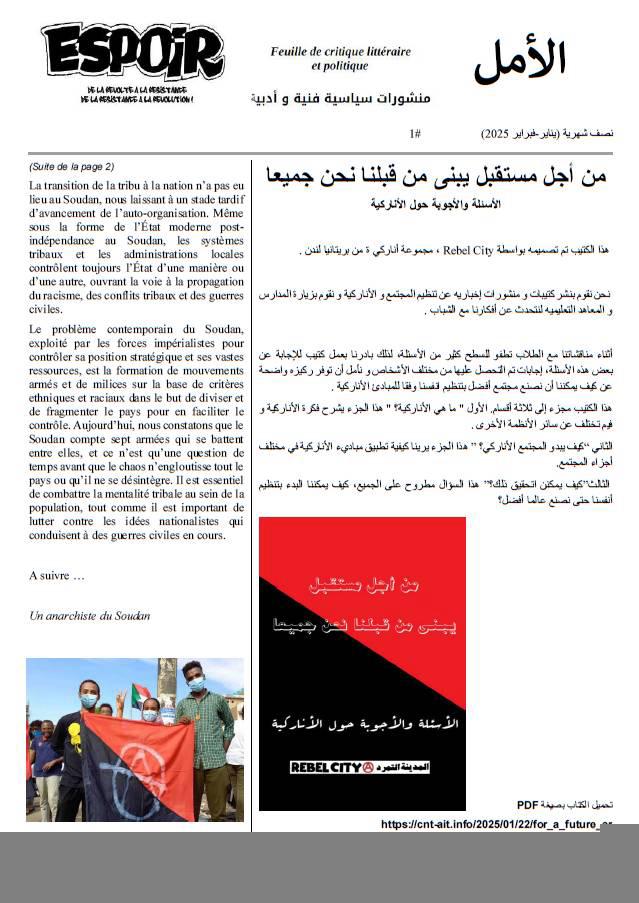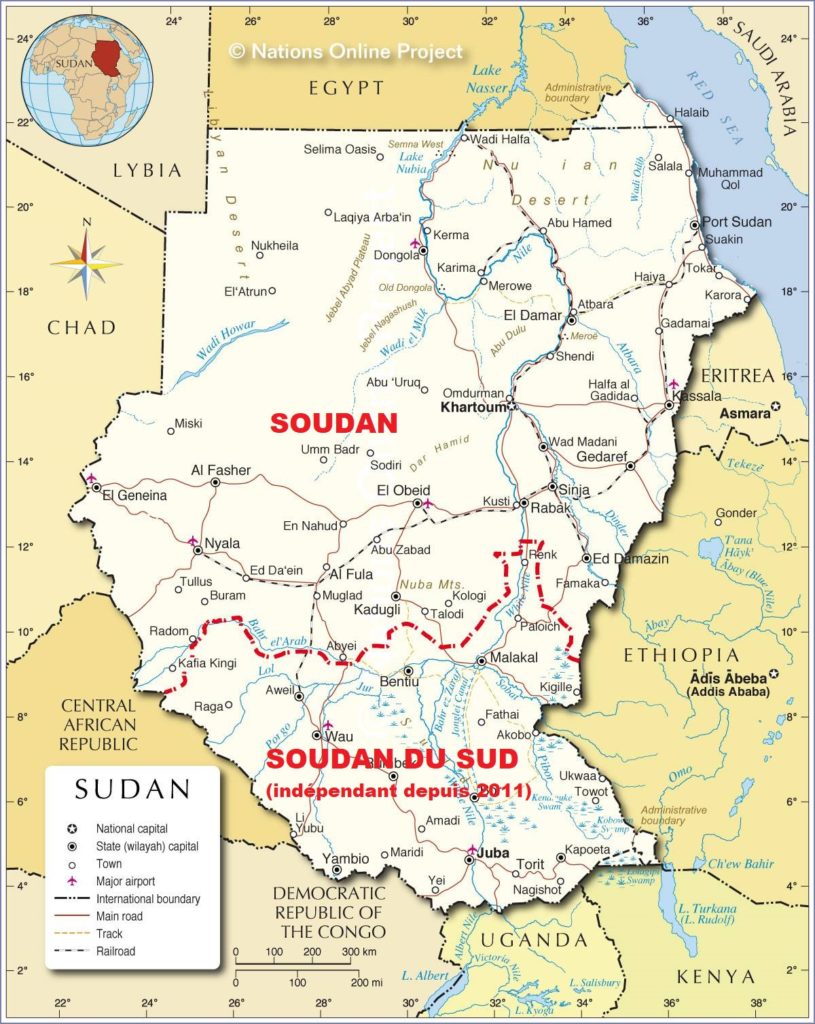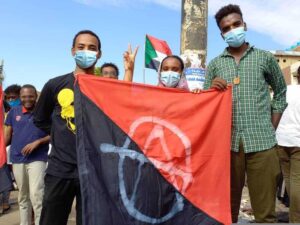
Originally posted on: https://cnt-ait.info/2025/02/09/hope-al-amal-1-2025/ edited slightly for ease of reading
—
الأمل (Al Amal) / Hope is a bilingual (Arabic / English) bimonthly issued jointly by the Sudan Anarchist Gathering, CNT-AIT France and their friends.
It aims to build bridges between anarchists from different continents, in continuation of the campaign of solidarity with the anarchists of Sudan.
If you want to receive the next issues, please contact us : contact@cnt-ait.info
If you want to support financialy the Sudan Anarchist Gathering, you can use our paypal https://www.paypal.com/paypalme/cntait1
(please validate “Sending ‘money to an individual’ to pay less bank charges)
Send an email to contact@cnt-ait.info to inform us of the donation and also so that we can keep you informed of its use.
—
Download(s)
Espoir-AL-Amal-2025-English / Arabic
Espoir-Al-Amal-2025-Spanish / Arabic
Espoir-AL-Amal-2025-French / Arabic
Hope / الأمل (Al Amal) #1, 2025
Why Would You Become an Anarchist in Sudan?
Original in arabic : لماذا تصبح أناركيًا في السودان؟
This question has always haunted me at many moments in a country of ideological, cultural, ethnic, tribal, and political diversity—where countless choices exist, yet none can be freely made. The moment you are born, your identity in Sudan is determined by religion, while your tribe plays a crucial role in shaping your culture and even your fate.
To become an anarchist in Sudan, you must have already escaped all these imposed identities and the suffocating constraints that push us into the furnace of the state.
Sudan is a country where war, crises, and disease have never ceased. Its people, saturated with military, religious, and tribal ideologies, serve as perfect fuel to ignite conflicts.
In such a country, I have always looked at my life with amazement. Our struggles often resemble action films—perhaps bizarre or unbelievable to outsiders—where survival means constantly fleeing from warring factions, dodging a hail of bullets fired directly at you. Bullets of the state, religion, tribe, sect, and armed factions.
Choosing to be an anarchist is an expression of true awareness of the failures of these systems. It is a consciousness that pushes you to the limits of both practical struggle and the deeply complex human experience. And this path leads to only two possible outcomes: you either survive as a true revolutionary resister, or you are consumed by the spiral of power.
Just as authority in Sudan takes many forms, so does opposition. There are political resistance movements, parties, mercenary armed groups, so-called revolutionary and liberal militias built on tribal structures, and cultural factions engaged in deep propaganda-driven authoritarianism.
These intertwined hierarchies form the crises of Sudanese peoples. Sudan is, in reality, a collection of small peoples trapped within a state that wields brutal power, recognizing no human rights beyond its own interests.
Furthermore, the ideology of extremist Islamists has been another tool for deepening ignorance and backwardness in Sudan.
Striving to confront all of this as a lone anarchist is like fighting as a wolf among packs of hyenas. If they find a single weakness in you, it will mean your inevitable destruction.
The path forward begins with seeking out those who share your ideas, developing them, and offering them knowledge and education. As an anarchist, you carry the feeling that wherever you are, and whatever your capacity, your mission is to spread freedom. The price of that freedom may be high—it may even cost you your life. Yet, all of this is just a small contribution to the scale of liberation that people need to live a dignified human life.
Freedom is the highest state of being, and anarchism shows us how to achieve and practice it.
Freedom is not just a poetic word to express aspirations—it is an effort, a commitment to being free with yourself and others, and a struggle to make freedom a reality. To be an anarchist is a blessing that cannot be monopolized or hidden. To be free is to be an anarchist, and to be an anarchist is to be free.
— Fawaz Murtada
Sudan: they are not satisfied with this blood !
After nearly two years of war, the truths and objectives of this war are becoming increasingly clear: the aim is simply to crush the revolution. Bashir’s recent speech, in which he referred to the revolutionaries as « scoundrels, » reflects the typical rhetoric of Islamists when describing young revolutionaries. He further accused them of wanting to return with violence and bloodshed, referring to the beginning of retaliatory operations—something the cadres of the Islamist terrorist movement have threatened since the war began.
They do not see the Janjaweed as their enemy; in fact, they have convinced themselves that this war has already been decided in their favor. But how can they claim victory when the Sudanese people are dead, wounded, displaced, or missing? I wonder how such individuals can even be human like us. These are the same people who killed the people from the start, divided them, sold off the nation’s resources, and then murdered them in cold blood.
I do not know the extent of the destruction they wish to achieve, but I now realize that if new campaigns of oppression emerge, we must rise up, renew our commitment to our martyrs, and resist them until our very last breath.
#TheRevolutionLivesOn, you scoundrels.
— Fawaz Murtada
Standing against the Rapid Support Forces (RSF) does not imply siding with the state

Standing against the Rapid Support Forces (RSF) does not imply siding with the state, especially for forces that foresaw the trajectory of this war from the outset. However, today, propaganda directed against revolutionary forces seeks to distort and dilute their longstanding opposition to the existence of this mafia since its inception. The divisive policies for Sudan, which the RSF has been accelerating more aggressively than the state itself, reveal the true intentions this institution has tried to impose through force and coups.
I want to highlight the nature of the discourse by leaders of the armed forces, such as the rhetoric we’ve witnessed regarding the newly formed militias under the pretext of fighting the RSF. These narratives have paved the way for the establishment of a peculiar belief in the military weakness of the state’s armed forces. This, in turn, opens the door wide for the emergence of more armies and armed groups. This is the policy of the state’s mafia, characterized by revoltingly sentimental speeches that in no way reflect the sacrifices of the Sudanese people.
Reconciliation with, and the honoring of, those who have killed the people—effectively giving them a platform—does not fall short of the crimes they committed. Instead, it reinforces these crimes and motivates further genocides. The popular forces must begin to build a counterforce to combat the propaganda of both the RSF mafia and the Islamist mafia, through direct confrontation of the lies that accumulate and exacerbate crises, the consequences of which fall solely on the people.
The struggle in Sudan transcends the conventional historical forms of resistance, such as armed struggle in military policies or civil activism through union-building, protests, and political advocacy.
Sudan’s unique context has given rise to diverse forms of struggle, shaped by the multifaceted nature of oppression. This diversity reflects the country’s complexity, even in its injustices. However, anarchists stand out in their deep examination of a critical issue rooted in the fabric of Sudanese society: tribalism—a force more regressive and extreme than nationalism itself.
For decades, Sudanese anarchists have critically analyzed the role of tribalism and its dominance, tracing its impact from the early days of small warring tribal states, through the colonial era’s reliance on tribal alliances, to its current status as a driving force behind Sudan’s persistent conflicts.
While tribalism remains central to the ongoing war and its continuation, Sudanese political forces often address this issue with hesitance, constrained by either political ties to tribes or fear of confronting tribal authority.
To shed light on this neglected issue, comrade Fawaz Murtada will explore the anarchist perspective on the history and impact of tribalism in Sudan through a series of articles.
The Tribe and the State : An Attempt to Analyze Authoritarian Conflict in Sudan from an Anarchist Perspective

This is an attempt from my humble self to explain the authoritarian conflict in Sudan from my point of view as an anarchist born in Sudan, drawing from my knowledge of its conflicts.
Before British colonialism, Sudan did not know a unified state but rather consisted of small states and kingdoms governed by tribal, ethnic, or clan systems, such as the Kingdom of Wadai, the Nubians, the Nuba Mountains’ kingdoms, and many others.
Sudan itself is divided into regions that bear significant cultural and social differences, making it difficult to compare with any other state.

The north of Sudan, for example, is inhabited by the remnants of Nubian kingdoms whose people share cultural ties across the border with Egypt, extending to Aswan.
In eastern Sudan, you will find the Beja tribes, Beni Amer, and Hadendowa, who have deep connections with Eritrea and Ethiopia.
Darfur, too, is divided into north and south regions, with significant cultural and ethnic differences. These areas also have connections with Chad and the Central African Republic.
The large kingdoms that the colonial powers tried to unite in pursuit of wealth, given Sudan’s riches in gold and fertile lands suitable for cotton cultivation at the time, remain at the heart of international disputes over Sudanese resources today. Colonial powers were unable to assimilate these communities into a single entity; instead, they applied policies that resulted in the separation of the north and south, as is still evident today.
All of this shows that, despite the revolutions that sought to expel the colonizers and unify the Sudanese kingdoms and communities, the tribal control system has remained dominant and in control to this day. This is one of the anarchist perspectives we will try to apply to our reality, aiming to deconstruct it through this lens.
Tribe and State
The tribe is a miniature form of social authority that possesses its own authoritarian culture and is governed by the authority of a tribal leader or chief, characterized by a hereditary transfer of leadership in most cases. It has been and continues to be the main obstacle in transforming the Sudanese people from a center of tribal conflict, violence, and immersion in ignorance and backwardness to a better stage.
Colonialism contributed to shaping hostilities between tribes by distinguishing some from others and arming them, granting them state authority, which formed complex coalitions of diverse human groups in even the simplest communal matters.
The transition from tribe to nationhood has not occurred in Sudan, leaving us at a late stage of self-organizational advancement. Even in the form of the modern state post-independence in Sudan, tribal systems and local administrations still control the state in one way or another, paving the way for the spread of racism, tribal conflicts, and civil wars.
The contemporary problem of Sudan, which is exploited by imperialist forces to control its strategic location and vast resources, is the formation of armed movements and militias based on ethnic and racial grounds in an attempt to divide and fragment the country for easier control.
Today, we find that Sudan has seven armed armies that have started fighting among themselves, and it is only a matter of time before chaos engulfs the entire country or it disintegrates. It is essential to combat the tribal mindset within the people, just as it is important to fight against nationalist ideas that lead to ongoing civil wars.
To be continued …
An anarchist from Sudan

